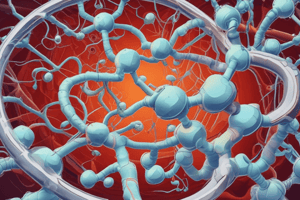Podcast
Questions and Answers
What happens to the rate of reaction as substrate concentration increases?
What happens to the rate of reaction as substrate concentration increases?
- It increases up to a certain point and then plateaus (correct)
- It decreases continuously
- It increases indefinitely
- It decreases up to a certain point and then stabilizes
What is the significance of the saturation point in enzyme reactions?
What is the significance of the saturation point in enzyme reactions?
- It shows the enzyme is denatured
- It leads to enzyme specificity
- It indicates the enzyme is inactive
- It marks the maximum rate of reaction (correct)
Which enzyme is being used in the practical to observe the effect of pH on activity?
Which enzyme is being used in the practical to observe the effect of pH on activity?
- Catalase
- Lipase
- Amylase (correct)
- Pepsin
What color does the iodine solution turn when starch is present?
What color does the iodine solution turn when starch is present?
What material is used to check for the presence of starch in the solution during the practical?
What material is used to check for the presence of starch in the solution during the practical?
Why does increasing substrate concentration above the saturation point have no effect on the rate of reaction?
Why does increasing substrate concentration above the saturation point have no effect on the rate of reaction?
What is required for enzymes to catalyze reactions effectively?
What is required for enzymes to catalyze reactions effectively?
What is the purpose of using a Bunsen Burner and water beaker in the enzyme activity experiment described?
What is the purpose of using a Bunsen Burner and water beaker in the enzyme activity experiment described?
What happens to enzyme activity if the temperature exceeds the optimum range in humans?
What happens to enzyme activity if the temperature exceeds the optimum range in humans?
Which color change indicates that starch is still present and has not been broken down in the enzyme activity experiment?
Which color change indicates that starch is still present and has not been broken down in the enzyme activity experiment?
Why is it essential for enzymes to have an optimum pH level?
Why is it essential for enzymes to have an optimum pH level?
Why is it important to repeat dropping the solution into wells containing iodine solution every 10 seconds during the enzyme activity experiment?
Why is it important to repeat dropping the solution into wells containing iodine solution every 10 seconds during the enzyme activity experiment?
What effect does a high or low pH have on enzyme activity?
What effect does a high or low pH have on enzyme activity?
What impact does temperature have on enzyme activity?
What impact does temperature have on enzyme activity?
Why does enzyme denaturation occur at extreme temperatures?
Why does enzyme denaturation occur at extreme temperatures?
In the enzyme activity experiment, what does the optimal pH of amylase suggest?
In the enzyme activity experiment, what does the optimal pH of amylase suggest?
What is the consequence of an enzyme being denatured?
What is the consequence of an enzyme being denatured?
How do rate calculations contribute to understanding enzyme activity?
How do rate calculations contribute to understanding enzyme activity?




